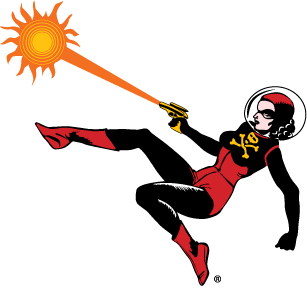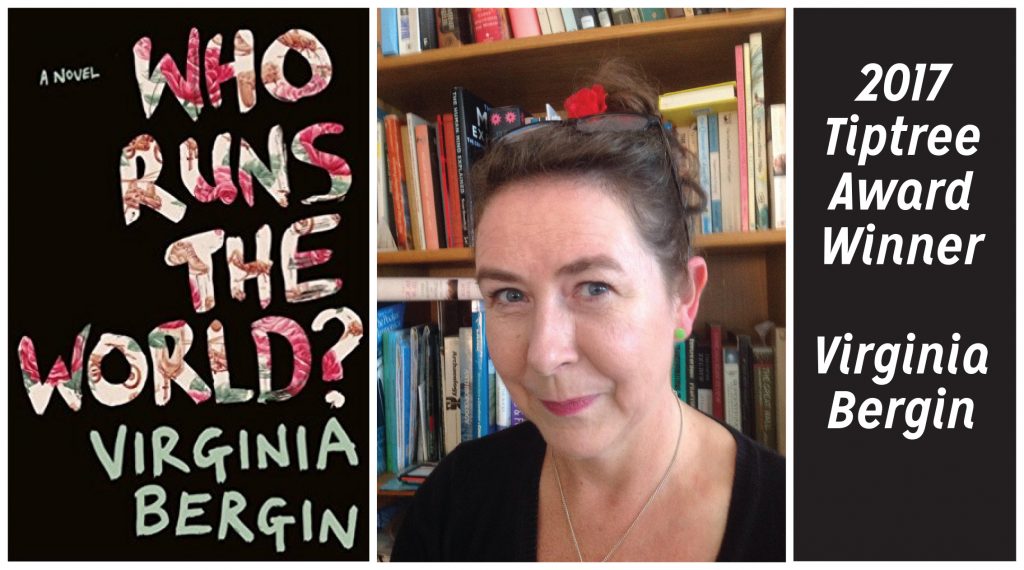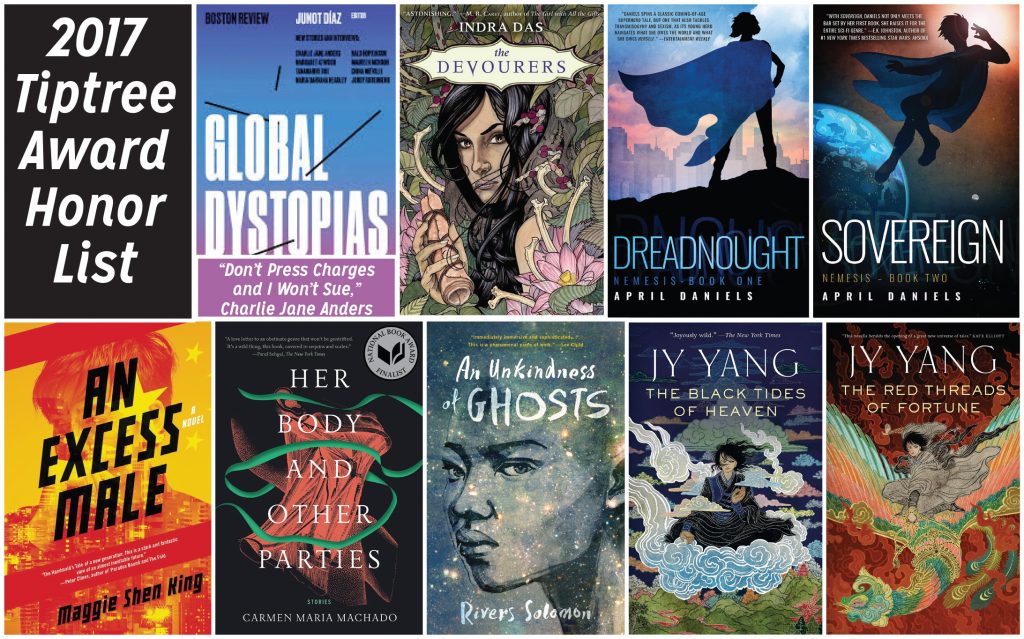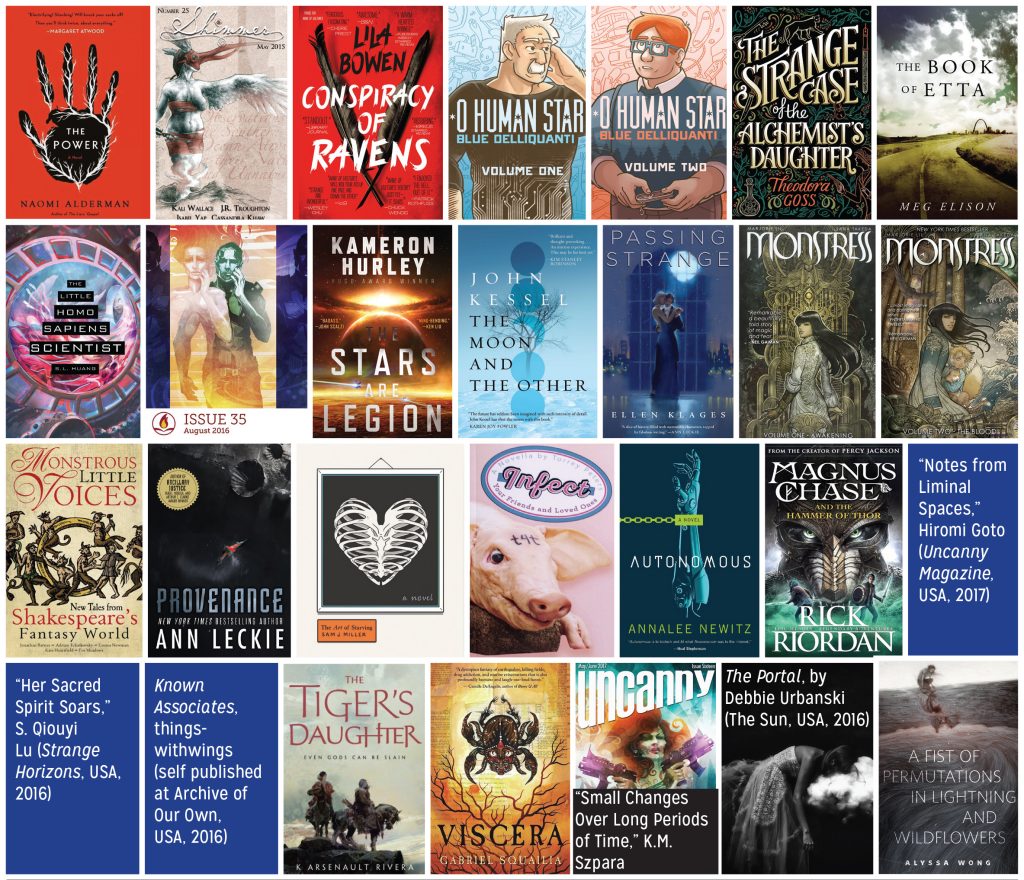The James Tiptree, Jr. Literary Award Council has selected the winner of the 2017 Tiptree Award — Virginia Bergin for her novel Who Runs the World? (Macmillan, UK, 2017). (Bergin’s novel is scheduled to be published in the US in September 2018 under the title The XY by Sourcebooks).
The James Tiptree Jr. Award is presented annually to works of science fiction or fantasy that explore and expand the understanding of gender and gender roles.
The 2017 award judges were Alexis Lothian (chair), E.J. Fischer, Kazue Harada, Cheryl Morgan, and Julia Starkey.
About the Winner:
Who Runs the World? is a young adult novel that tells an intricately layered tale of intergenerational struggle and cooperation, the dehumanizing force of gender stereotypes, and the moral courage it takes to challenge cultural and political norms. Bergin invokes a premise familiar in feminist science fiction—a plague that kills nearly everyone with a Y chromosome. Without relying on biological determinism, Bergin uses this premise to develop a vividly imagined feminist society, and to grapple with that society’s changes and flaws over time.
Born three generations after the plague, into a social order rebuilt around consensus, 14-year-old River views her world as idyllic––until she discovers Mason, a teenage boy who has escaped from one of the “Sanctuaries” where “XYs” are held. As River, along with her mother and grandmother, learns about the violence of Mason’s life, she sees her community’s norms upended and hidden biases exposed. But the story does not end with the exposure of the seeming utopia’s hidden subjugations. For River has been shaped by a society that built itself with purpose and care around principles of justice. Growing up amid those principles has given River the tools to challenge her own culture’s fundamental contradictions. In an ultimately optimistic vision, Bergin dares to depict a future in which principles of transformative justice can have, if not victory over, at least even footing with the incentives of profit and exploitation.
Honor List: In addition to selecting the winners, the jury chooses a Tiptree Award Honor List.
The Honor List is a strong part of the award’s identity and is used by many readers as a recommended reading list.
These notes on each work are excerpted and edited from comments by members of this year’s jury.
- Charlie Jane Anders, “Don’t Press Charges and I Won’t Sue” (Boston Review, USA, 2017) — This graphic and visceral dystopia shows trans people stripped of their legal rights, abducted, and operated on in the name of “curing” their gender identities. Harrowingly portrayed through the viewpoints of both victim and perpetrator, the story describes a medicalized torture resonant with real-world histories of violent “treatment” for gender deviance that were routine only a few decades ago. Showing how fragile the human rights of marginalized people can be, Anders gives readers a glimpse of what has been a lived nightmare for many, and remains a terrifying possible future.
- Indra Das, The Devourers (Del Rey, USA, 2016) — A fascinating, memorable novel that uses a nested narrative to thread its story through Indian history, from the 17th-century Mughal Empire to contemporary Kolkata. The structure uses multiple points of view to mirror the perspective of the book’s magical characters: a species of predatory shape-shifters who gain access to the memories of the people they consume. Inspired by mythological beings that include werewolves, djinn, and rakshasa, Das’s shape-shifters perceive gendered human behavior in illuminating ways, as the novel’s initial narrator––a queer present-day historian––comes to learn. The novel is beautifully written, using its original speculative framework to explore questions of gender, culture, and identity in new ways.
- April Daniels, Dreadnought and Sovereign (Diversion, USA, 2017) — The first two books of a trilogy, these novels follow Danny, a transgender teenage girl stuck living as a boy. A chance meeting with a dying superhero allows Danny to have her deepest desire granted, with the side effect that she’s now the most powerful superhero on the planet. Daniels’ familiarity with the issues faced by trans people invests these books with a rarely achieved feeling of authenticity. The novels explore the family stress experienced by trans youth and dive headlong into contemporary political controversies surrounding trans rights. That they are excellent superhero fiction as well should see them widely enjoyed, and their message received by a broad audience.
- Maggie Shen King, An Excess Male (Harper Voyager, USA, 2017) — A novel of exquisitely deep, nuanced characterization, set in a future China where there are forty million more men than women. This book explores polyandrous marriage, non-neurotypical cognition, state-sanctioned homophobia, and the dynamics of bonding in male-only spaces. It also features an exciting and unusual plot structure, beginning as a contemplative study of family that gradually accelerates to the pace of a techno-thriller.
- Carmen Maria Machado, Her Body and Other Parties (Gray Wolf, USA, 2017) — A collection of short stories that explore the cultural treatment of women’s bodies, written with stunning artistry. These formally inventive tales use the speculative to illuminate the interiors of gendered worlds, from a worldwide plague viewed through its last survivor’s erotic connections to a reinterpretation of Law & Order: Special Victims Unit episodes that becomes a meditation on sexual violence. Machado offers a multifaceted view of the insides and undersides of queer kinds of femininity that we mostly never see, brought into the light in all their darkness and brightness, sweetness and ugliness.
- Rivers Solomon, An Unkindness of Ghosts (Akashic, USA, 2017) — A powerful novel of individual and collective survival in the face of generational trauma. On a generation ship, the Black inhabitants of the lower decks live and work under brutal conditions that recall slavery in antebellum America. The story follows lowerdecker Aster as she struggles to survive and make sense of her world. The capacity to maintain culture and possibility within bondage are key to Aster’s story, as is the way that the main characters––none of whom are wholly neurotypical––give one another space for their difference even when they are incomprehensible or even dangerous to one another.
- JY Yang, “Black Tides of Heaven” and “Red Threads of Fortune” (Tor, USA, 2017) — Set in a society where children are without gender until they choose to be confirmed into a specific identity, these paired silkpunk novellas follow aristocratic twins from their identical childhoods through increasingly divergent adulthoods. The first is a bildungsroman of Akeha, the male twin, who must learn himself at a young age because he lacks any defined place within his family or culture. The second is a recovery narrative of Mokoya, the female twin, whose relatively frictionless path through life demands of her little introspection, until a traumatic event upends her sense of self, requiring she build a new understanding of her identity to navigate her grief. Both stories explore the process of struggling past expectation to achieve self-definition.
Additional Recommended Works: In addition to the honor list, this year’s jury also compiled a long list of twenty-six other works they found worthy of attention.
- The Power, Naomi Alderman (Viking, UK, 2016)
- “Palingenesis,” Megan Arkenberg (Shimmer, USA, 2016)
- Conspiracy of Ravens, Lila Bowen (Orbit, USA, 2016)
- O Human Star, vol. 1 and 2, Blue Dellaquanti (self published, USA, 2017)
- The Strange Case of the Alchemist’s Daughter, Theodora Goss (Saga, USA, 2017)
- The Book of Etta, Meg Elison (47 North, USA, 2017)
- “Notes from Liminal Spaces,” Hiromi Goto (Uncanny, USA, 2017)
- “The Little Homo Sapiens Scientist”, SL Huang (Book Smugglers, USA, 2016)
- “Your Body, by Default,” Alexis A. Hunter (Fireside Magazine, USA, 2016)
- The Stars Are Legion, Kameron Hurley (Saga, USA, 2017)
- The Moon and the Other, John Kessel (Saga, USA, 2017)
- Passing Strange, Ellen Klages (Tor, USA, 2017)
- Monstress, Volumes 1 and 2, by Marjorie Liu and Sana Takeda (Image, USA, 2016)
- “Coral Bones,” Foz Meadows (Monstrous Little Voices, Rebellion, UK, 2016)
- Provenance, Ann Leckie (Orbit, USA, 2017)
- “Her Sacred Spirit Soars,” S. Qiouyi Lu (Strange Horizons, USA, 2016)
- The Art of Starving, Sam J. Miller (Harper, USA, 2017)
- Infect Your Friends and Loved Ones, Torrey Peters (self-published, 2016)
- Autonomous, Annalee Newitz (Tor, USA, 2017)
- Magnus Chase and the Hammer of Thor, Rick Riordan (Hyperion, USA, 2017)
- The Tiger’s Daughter, K. Arsenault Rivera (Tor, USA, 2017)
- Viscera, Gabby Squalia (published as Gabriel Squalia, Talos, USA, 2016)
- “Small Changes Over Long Periods of Time,” K.M. Szpara (Uncanny, USA, 2017)
- Known Associates, thingswithwings (self-published at Archive of Our Own, USA, 2016)
- Story sequence by Debbie Urbanski: “The Portal,” (The Sun, USA, 2016); “The Thread,” (Cicada, USA, 2016); “A List of My Utopias,” (The Sun, USA, 2017); “How to Find a Portal,” (Lightspeed, USA, 2017); “A Few Personal Observations About Portals,” (The Sun, USA, 2017)
- “A Fist of Permutations in Lightning and Wildflowers,” Alyssa Wong (Tor.com, USA, 2016)
The Tiptree Award winner, along with authors and works on the Honor List will be celebrated during Memorial Day weekend at WisCon in Madison, Wisconsin. The winner will receive $1000 in prize money, a specially commissioned piece of original artwork, and (as always) chocolate.
Help Needed for 2018 Award: Reading for 2018 will soon begin. The panel will be chaired by Margaret McBride.
The Tiptree Award invites everyone to recommend works for the award via the recommendation page of Tiptree Award website. On the website, you can also donate to help fund the award and read more about past winners and works it has honored.
Tiptree Award History: The James Tiptree Jr. Award was created in 1991 to honor Alice Sheldon, who wrote under the pseudonym James Tiptree, Jr. By her choice of a masculine pen name, Sheldon helped break down the imaginary barrier between “women’s writing” and “men’s writing.” Her insightful short stories were notable for their thoughtful examination of the roles of men and women in our society.
Since its inception, the Tiptree Award has been an award with an attitude. As a political statement, as a means of involving people at the grassroots level, as an excuse to eat cookies, and as an attempt to strike the proper ironic note, the award has been financed through bake sales held at science fiction conventions across the United States, as well as in England and Australia. Fundraising efforts have included auctions conducted by Ellen Klages and Sumana Harihareswara, the sale of t-shirts and aprons created by collage artist and silk screener Freddie Baer, and the publication of four anthologies of award winners and honor-listed stories. The anthologies are in print and, along with two cookbooks featuring recipes and anecdotes by science fiction writers and fans, The Tiptree Quilt Story, and other Tiptree-related publications, can be purchased through tiptree.org/store.
In addition to presenting the Tiptree Award annually, the James Tiptree, Jr. Literary Award Council presents two annual $500 fellowships to provide support and recognition for the new voices who are making visible the forces that are changing our view of gender today. The Council also occasionally presents the Fairy Godmother Award, a special award in honor of Angela Carter. Described as a “mini, mini, mini, mini MacArthur award,” the Fairy Godmother Award strikes without warning, providing a financial boost to a deserving writer in need of assistance to continue creating material that matches the goals of the Tiptree Award.
[Based on the press release.]
Discover more from File 770
Subscribe to get the latest posts to your email.





Looks like a fabulous list.
Huh. Who Runs The World had not shown up on my radar, so I looked it up and was surprised to find the online reviews are pretty abysmal. Granted, reviews are not the be-all and end-all of whether a book is good, and a surprising number of reviews of the book do not seem to be getting that opinion-of-the-characters is not the same thing as opinion-of-the-book/author. But there are also a lot of complaints about writing style, the narration, the ending, etc. I haven’t read it, though, so who knows?
Of the books I have read on the extended lists, I thought The Power was great, Dreadnought and Sovereign were very good, Provenance, The Stars Are Legion, and Monstress were all good, interesting, and definitely worth reading, and The Strange Case of the Alchemist’s Daughter, and Passing Strange were OK but somewhat disappointing.
Autonomous and Her Body and Other Parties are waiting on the shelf. 🙂
The 2018 Recommendation link should be
https://tiptree.org/award/2018-james-tiptree-jr-award/recommend-works-for-the-2018-james-tiptree-jr-award
I adored Passing Strange, even though the fantastical elements mainly occur at the end. It’s on my nomination ballot for Hugo Best Novella.
I too was surprised at seeing the tepid reviews online for Who Runs the World?, but the jury recommended lots of good stuff, and they liked this best, so I’m anxiously awaiting my copy from Amazon UK (which — full disclosure — as a member of the Tiptree Motherboard I was able to order last week while we got all our ducks in a row for the press release; because I wasn’t monitoring the jury this year, I had never heard of the book either until they told us who they had chosen).
For those who missed last year’s under-the-radar winner, When the Moon Was Ours by Anna-Marie McLemore is absolutely wonderful.
(Thanks, JJ, for fixing the link.)
JJ: Well, that was an important catch. Appertain away! While my proofreading is infamous, I didn’t even try to proof the links in the press release because I had to get on the road for another visit to my mother.
I will say Dreadnought is probably the most intense superhero book I ever read. The combat scenes are terrifyingly grim, but not as nerve wracking as the scenes where Danny deals with her father.
Wow, that’s quite a winner + honors list + recommended works list!
I must squee that they chose one of my favorite webcomics, “O Human Star,” as a recommended work. 🙂 Apparently I’m not the only one who reads it, yay!
IIRC, I’ve heard of the winner, though I know little about it. There are books a lot of folks like that I couldn’t stand, and the Tiptree Award is for a particular thing, so tepid or poor reviews for the winner doesn’t carry a ton of weight with me in this particular case.